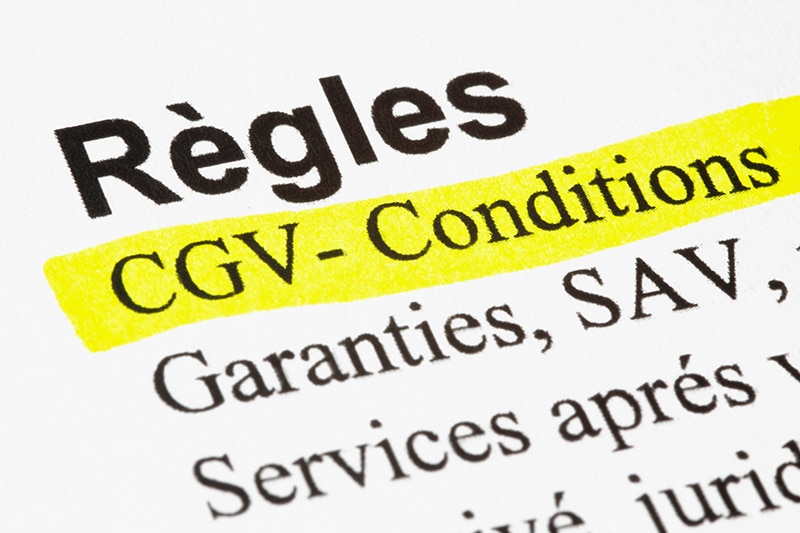What if my customer does not pay my invoice? Full guide to securing your payment

In France, 25% of business bankruptcies are directly caused by late payments and unpaid bills. But what exactly is an unpaid invoice? An unpaid invoice is an invoice issued by a company that has not been paid by its customer within the agreed time frame. This can lead to significant financial difficulties, jeopardizing the stability and growth of the business.
Anticipating and acting quickly are the keys to avoiding unpaid invoices or at least minimizing their impact. But how and with what tools to protect its interests and guarantee the payment of its invoices? What measures can be taken to prevent late payments?
To better understand the challenges of unpaid invoices , discover in this article a detailed step-by-step guide on managing unpaid invoices, from prevention to implementing effective strategies.
STEP 1: decipher your customers’ purchasing process to better anticipate unpaid bills before they occur

In debt collection, prevention is often the key to avoiding unpleasant surprises. It is therefore essential to decipher the purchasing process of your customers in order to better anticipate late payments. Here are some winning strategies to reduce late payments and optimize your chances of successfully collecting your debts:
Anticipate late payments
Do you know the purchasing practices of your customers? Who validates and executes the payment? And above all, are you attentive to any risk related to the solvency of your customers? A thorough understanding of their buying habits, payment policy, and settlement history can help you assess potential risks and take preventative action. Analyze the average payment times of each customer, identify any financial difficulties and be vigilant for any indication of payment delays.
Also be sure to carefully write your general terms and conditions of sale (GTC) in a clear and precise manner, in order to establish firm payment rules and limit ambiguities. Include clauses relating to late payment penalties, late payment interest and methods of recovering unpaid debts.
Key recovery players: how to identify them and use them to your advantage?
Identify the stakeholders in the purchasing process within your customers. By knowing the people involved in the process, their role, their department and their contact details, you can act quickly and efficiently in the event of a late payment.
Get the tools: invoicing software, reminders, financial information platform on companies, etc.
To facilitate the management of your invoices and the follow-up of payments, equip yourself with invoicing and reminder software . These automated tools allow you to issue invoices quickly, track pending payments, and set up automated reminders for late payments. Additionally, using corporate financial information platforms can give you valuable insight into your customers’ creditworthiness and help you make informed decisions when building business relationships.
STEP 2: well-drafted General Terms and Conditions of Sale and invoices

Well-drafted General Terms and Conditions of Sale (GTC) and invoices are key elements to protect your financial interests and ensure payment for your products or services. Among the essential legal clauses in your invoices and T&Cs, we find:
- The date of payment is set at 30 days after receipt of the product or service, according to the Commercial Code . It can be extended to 45 days or 60 days upon negotiation between the creditor and the debtor.
- The price list as well as any applicable reductions or rebates,
- Late payment penalties , the legal penalty rate of which is set by the European Central Bank,
- The retention of title clause : this clause provides that you remain the owner of the goods sold until full payment of the price, thus allowing you to recover your goods in the event of non-payment,
- The jurisdiction clause : this clause makes it possible to determine the competent jurisdiction in the event of a dispute, which can be useful if your customers are established far from your place of residence,
- The penalty clause which specifies the damages in the event of non-payment on the due date,
- The termination clause used to secure the transaction and protect your interests in the event of non-payment
Also include the mandatory information required by the legislation in force, in particular your full contact details and details of the products or services provided.
STEP N°3: how to make a good follow-up with the customer?

To maximize your chances of recovering your debts, it is important to put in place an effective follow-up strategy:
- Take care of the commercial relationship “convince and not constrain” : emphasize the importance of maintaining a lasting and beneficial collaboration. Remain professional and courteous, avoiding any aggressive or accusatory tone.
- Follow up effectively by telephone in a rhythmic manner and adapted to the nature of the unpaid: prepare your arguments in advance, asking why the payment has not been made and putting the impact of the late payment on your cash flow. Remain calm and empathetic, while being firm on the importance of regularizing the situation.
- Follow up in writing if the telephone steps have not resulted in payment: send a first reminder email 5 days before the due date of the invoice, indicating the late payment. After 5 days , send a second, more direct follow-up email, highlighting the non-payment and recalling the consequences of non-payment. You can send a third and final email, granting a period of 8 days to regularize the situation.
- Formal notice : If you have no answer after the 8-day period previously granted, you can send your customer a letter (by post with AR) of formal notice, specifying the amount due, the penalties for late payment by invoice, the payment deadlines and the legal consequences in the event of non-payment.
Nb: How to write a letter of formal notice? Although this document is not mandatory, it is a valuable ally before the judge. The letter must be precise, formal and explicit. Mention all the necessary information, including invoice references, contact details for each party, the nature of the dispute, the amount due, the dates of payment and the consequences in the event of non-payment. Once ready, the mail should ideally be sent by registered mail with acknowledgment of receipt.
STEP N°4: how to deal with a customer who still does not pay?

If, despite written and telephone reminders, no action is taken by the client, the file then goes to the litigation department or to a debt collection firm:
- Amicable collection : after contacting a firm specializing in collection, the latter will attempt to obtain amicable debt collection with the client, by negotiating payment terms suitable for both parties.
- The order for payment: an effective procedure. The order for payment is a judicial recovery procedure in which the creditor brings a lawsuit against his debtor in court to claim the amount due. It is a simple and effective legal procedure for recovering unpaid debts.
NB: To obtain an order for payment, you must file a request with a competent court, accompanied by all the necessary evidence (unpaid invoices, reminders made and other relevant contractual documents). Make sure that the debt is due and certain, that it includes a contractual clause or results from a statutory obligation (art. 1405 of the Code of Civil Procedure). If the judge is convinced of the validity of the claim, then the payment order will be accepted. This order gives the power to seize the debtor’s funds or property to recover the amount owed. - A bank seizure can then be carried out by the bailiff, with the authorization of the judge.
The assignment to the fund
Summons to the fund is a legal procedure allowing the dispute to be submitted to a qualified court so that it can render a final decision on the merits of the case. This procedure is longer and requires a detailed presentation of the facts and arguments.
The interim relief
The summary provision, meanwhile, is an emergency procedure aimed at obtaining a provisional sum of money to meet immediate needs, pending a final decision. This procedure makes it possible to quickly obtain an interim payment order, based on a color of right.
Using a collection agency: when and how?

When the recovery measures have not resulted in a settlement on the part of the customer, the creditor can call on a collection agency for an amicable or judicial debt collection.
- Situational assessment
Evaluate the seriousness of the problem and determine if the use of a collection agency is necessary. If the outstanding payments persist despite your efforts, then it is time to seek external expertise.
- How to select the right agency?
Choose a collection agency that has solid experience in the field. Make sure that the agency offers a full range of collection services: amicable collection, judicial debt collection in France and possibly abroad. A versatile agency will be able to adapt its strategy according to your needs.
Expert in credit management for more than 50 years, GESTION CREDIT EXPERT contributes to preserving the financial health of companies by offering amicable and judicial debt collection services in France and abroad. With our 50 employees and our 300 partners, we offer a tailor-made service adapted to your business environment, framed by our Quality policy and our CSR approach.
- Communication of information
Provide the collection agency with all relevant information regarding the customer, the unpaid invoice and the steps already taken. The more complete the information, the more effectively the agency will be able to act.
Preserve your cash flow with a solution you can trust!
According to Forbes , approximately 56 billion euros of receivables in France remain unpaid , and only 2 billion euros are recovered by professionals. The negative consequences of unpaid invoices are multiple and can lead to significant financial difficulties. From delays in paying suppliers to reduced cash available to invest in business development, these situations can jeopardize the stability and growth of any organization.
To deal with this, it is recommended to call on a Credit Management expert to determine the best strategy to adopt in your particular case. With its expertise in the field, GESTION CREDIT EXPERT provides you with qualified professionals, a personalized strategy and effective solutions to recover your unpaid debts, while preserving your commercial relations.
